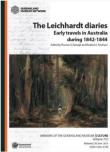 541268119030926860.jpg
541268119030926860.jpg
 541268119030926860.jpg
541268119030926860.jpg
'The publication by the Queensland Museum of the translation by Thomas Darragh of the Leichhardt Diaries from his arrival in Australia until the departure of the Port Essington expedition is a monumental addition to Leichhardt scholarship. It is hard to think of a more appropriate way to celebrate the bicentenary of Leichhardt's birth.' (Source: http://www.harbeck.com.au/Ludwig-Leichhardt.pdf )
'Scholars considering the acoustics of exploration have focused on how explorers heard Australian space in terms of silence, to argue this silenced Indigenous presence, or that stillness, was incongruous with how a place to be colonised should sound. I focus on the acoustically attuned Ludwig Leichhardt, a science-poet indebted to the Enlightenment, but also engaged with the German Romantic legacy. The manifold acoustic dimensions of expeditioning – including music – were important to him in different ways. The acoustic world could be assayed and harnessed in ways that were often consistent with colonialism. But there was also something fugitive about acoustics. They could mark a site for emotional engagement with place, and sometimes embryonic cross-cultural dialogue. Yet the possibilities were not always heard and, in line with Romanticism, the acoustic could drag down expeditioners’ spirits just as it could buoy them up. It could baffle or be a site for Indigenous resistance.' (Publication abstract)
'This paper examines Ludwig Leichhardt's early Australian diaries, spanning from April 1842 until July 1844, in relation to his cultural legacy. Although Leichhardt's standing as an explorer was initially established following the success of his journey to Port Essington in 1844-46, his reputation in Australia was later damaged by controversies arising from rival accounts of both this first journey and particularly of the second expedition of 1846-47. These controversies, at times informed by anti-Prussian and later by anti-German prejudices, have dominated Leichhardt's reception in Australia, while at the same time diverting attention from his German cultural background and the ways in which it may have influenced his writings on Australia. Leichhardt's education took place within the contexts of the late German Enlightenment, of philosophical idealism and of romanticism, and key elements of those interrelated movements can be detected in his early Australian diaries. It is, moreover, clear that Leichhardt saw his letters and diaries as contribution not only to the natural sciences, but also to the genre of romantic travel literature, exemplified by his idol Alexander von Humboldt, among others. This in turn raises the possibility that Leichhardt's own romantic modes of expression may have influenced his most culturally resonant alter-ego in the canon of Australian literature, the eponymous protagonist of Patrick White's novel Voss (1957). ' (541)
'This paper examines Ludwig Leichhardt's early Australian diaries, spanning from April 1842 until July 1844, in relation to his cultural legacy. Although Leichhardt's standing as an explorer was initially established following the success of his journey to Port Essington in 1844-46, his reputation in Australia was later damaged by controversies arising from rival accounts of both this first journey and particularly of the second expedition of 1846-47. These controversies, at times informed by anti-Prussian and later by anti-German prejudices, have dominated Leichhardt's reception in Australia, while at the same time diverting attention from his German cultural background and the ways in which it may have influenced his writings on Australia. Leichhardt's education took place within the contexts of the late German Enlightenment, of philosophical idealism and of romanticism, and key elements of those interrelated movements can be detected in his early Australian diaries. It is, moreover, clear that Leichhardt saw his letters and diaries as contribution not only to the natural sciences, but also to the genre of romantic travel literature, exemplified by his idol Alexander von Humboldt, among others. This in turn raises the possibility that Leichhardt's own romantic modes of expression may have influenced his most culturally resonant alter-ego in the canon of Australian literature, the eponymous protagonist of Patrick White's novel Voss (1957). ' (541)
'Scholars considering the acoustics of exploration have focused on how explorers heard Australian space in terms of silence, to argue this silenced Indigenous presence, or that stillness, was incongruous with how a place to be colonised should sound. I focus on the acoustically attuned Ludwig Leichhardt, a science-poet indebted to the Enlightenment, but also engaged with the German Romantic legacy. The manifold acoustic dimensions of expeditioning – including music – were important to him in different ways. The acoustic world could be assayed and harnessed in ways that were often consistent with colonialism. But there was also something fugitive about acoustics. They could mark a site for emotional engagement with place, and sometimes embryonic cross-cultural dialogue. Yet the possibilities were not always heard and, in line with Romanticism, the acoustic could drag down expeditioners’ spirits just as it could buoy them up. It could baffle or be a site for Indigenous resistance.' (Publication abstract)